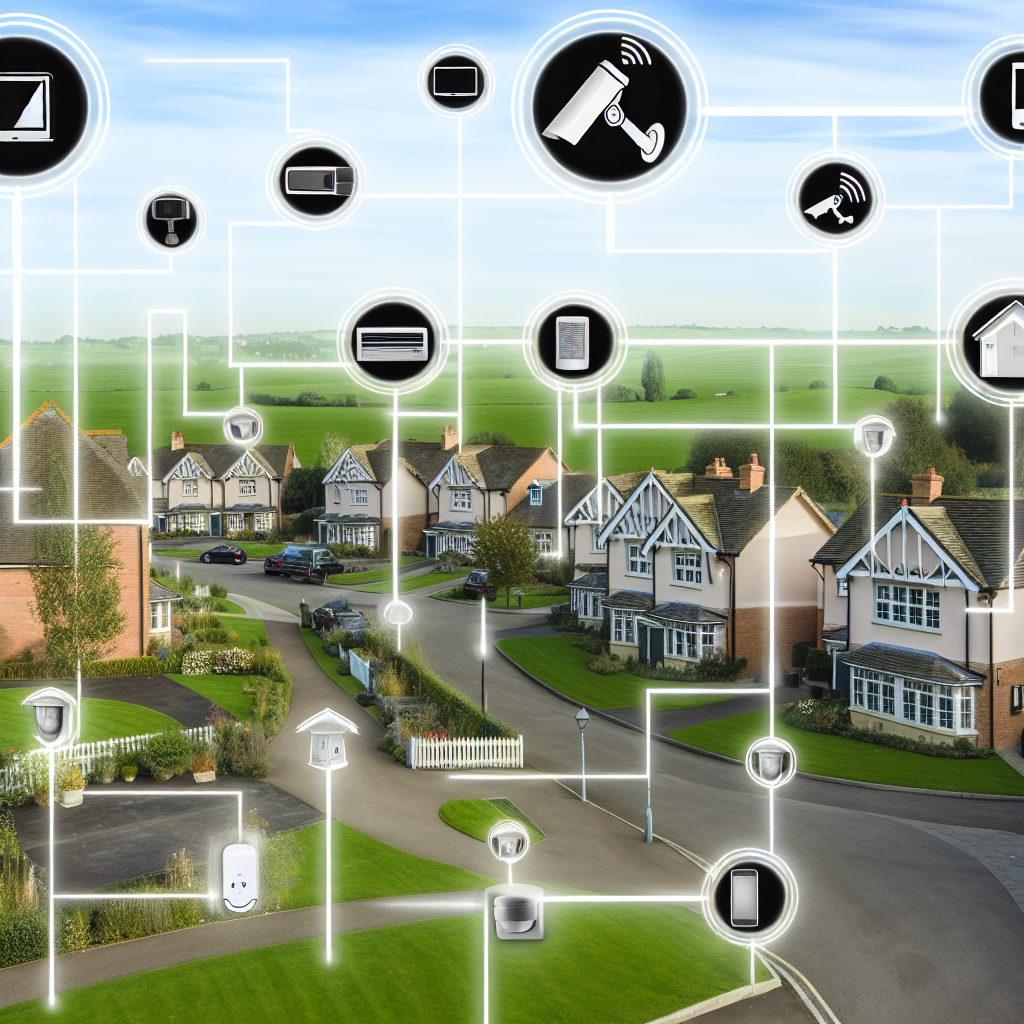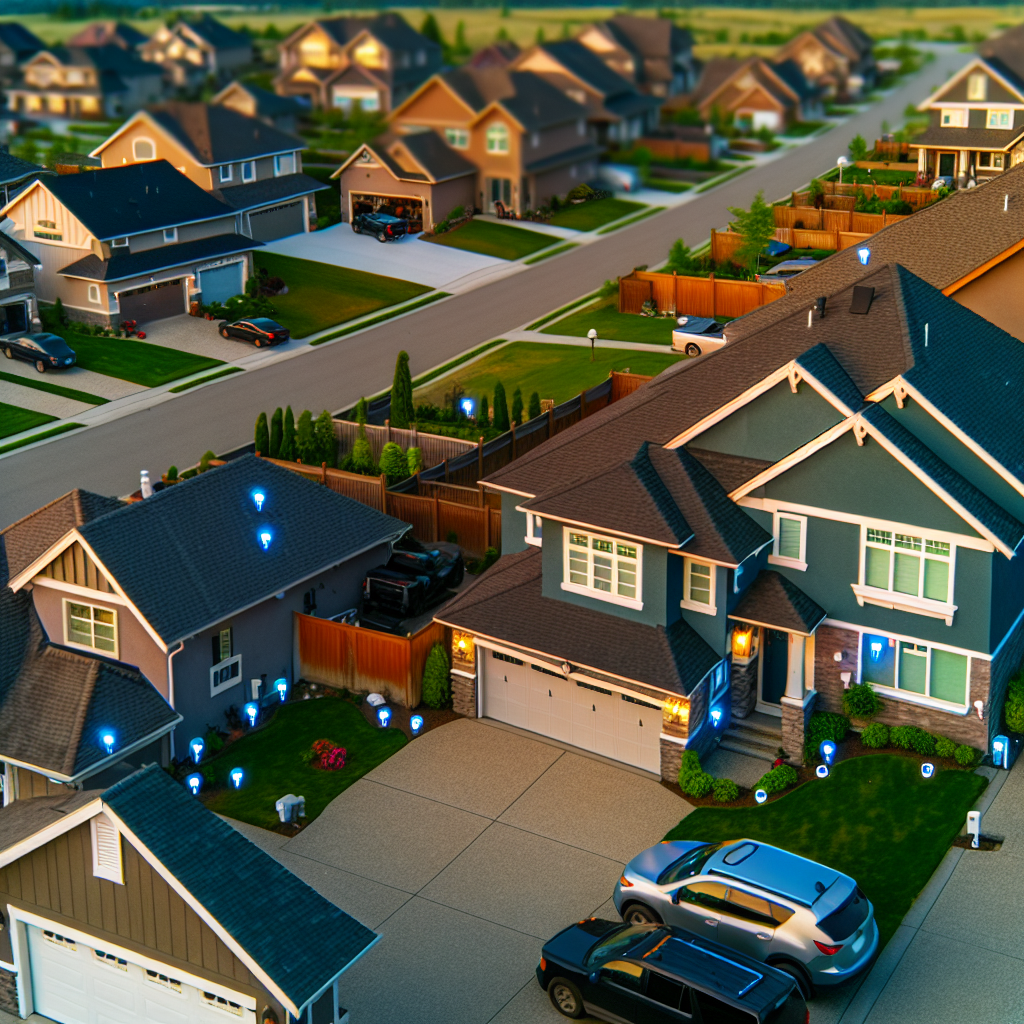“Protect your neighborhood and ensure the safety of your home with residential security. Upgrade to smart home systems for added convenience and peace of mind. Take the first step towards a secure home by getting a free quote from American Security Products. Click here to get started: https://www.americanspd.com/free-quote“
The Importance of Residential Security for Neighborhood Safety
Residential security is a crucial aspect of ensuring neighborhood safety. With the rise of smart home systems, it has become easier than ever to protect our homes and communities from potential threats. In this article, we will explore the importance of residential security and how it can maximize neighborhood safety.
First and foremost, residential security is essential for the safety of our homes and families. Our homes are our sanctuaries, and it is our responsibility to ensure that they are well-protected. With the advancements in technology, there are now various security systems available that can be tailored to fit the specific needs of each household. These systems include surveillance cameras, motion sensors, and smart locks, among others.
One of the main benefits of residential security is the deterrence of crime. Studies have shown that homes with visible security systems are less likely to be targeted by burglars. This is because criminals are less likely to take the risk of breaking into a home that has a high chance of getting caught. Therefore, by investing in residential security, we are not only protecting our own homes but also contributing to the overall safety of our neighborhood.
Moreover, residential security systems also provide peace of mind. With the ability to monitor our homes remotely, we can rest assured that our homes are safe even when we are away. This is especially beneficial for those who travel frequently or have children or elderly family members at home. With the touch of a button, we can check on our homes and receive real-time alerts in case of any suspicious activity.
In addition to protecting our homes, residential security also plays a significant role in ensuring the safety of our neighborhood. When a home is broken into, it not only affects the homeowner but also creates a sense of fear and insecurity among the neighbors. By having a strong residential security system in place, we are not only protecting our own homes but also creating a safer environment for our neighbors.
Furthermore, residential security systems can also be integrated with smart home technology, making our homes more efficient and convenient. With the use of smart locks, we can remotely lock and unlock our doors, eliminating the need for physical keys. This is not only convenient but also reduces the risk of lost or stolen keys falling into the wrong hands. Additionally, smart home systems can also control lighting, temperature, and other appliances, making our homes more energy-efficient.
Another aspect of residential security that often goes unnoticed is the protection it provides against natural disasters. With the use of sensors, we can receive alerts in case of fire, carbon monoxide leaks, or flooding. This early warning system can save lives and prevent significant damage to our homes.
In conclusion, residential security is crucial for maximizing neighborhood safety and ensuring smart home systems. It not only protects our homes and families but also contributes to the overall safety and well-being of our community. With the advancements in technology, there are now various options available to fit the specific needs and budget of each household. By investing in residential security, we are not only protecting our homes but also creating a safer and more efficient living environment.
How Smart Home Systems Enhance Residential Security

In today’s world, technology has become an integral part of our daily lives. From smartphones to smart homes, we are constantly surrounded by devices that make our lives easier and more convenient. One area where technology has made a significant impact is in residential security. With the rise of smart home systems, homeowners now have the ability to enhance their residential security and maximize neighborhood safety.
Smart home systems are a combination of devices and appliances that are connected to a central network and can be controlled remotely. These systems use sensors, cameras, and other advanced technology to monitor and protect your home. They can be accessed and controlled through a smartphone or tablet, making it convenient for homeowners to keep an eye on their property even when they are away.
One of the main ways in which smart home systems enhance residential security is through the use of cameras. These cameras can be strategically placed around the perimeter of the house to monitor any suspicious activity. They can also be equipped with motion sensors, which will trigger an alert if any movement is detected. This allows homeowners to be immediately notified of any potential threats and take necessary action.
Moreover, these cameras also have the ability to record footage, which can be used as evidence in case of a break-in or any other criminal activity. This not only helps in catching the culprit but also acts as a deterrent for potential burglars. Knowing that their actions are being recorded, criminals are less likely to target a home with a smart home security system.
Another way in which smart home systems enhance residential security is through the use of smart locks. These locks can be controlled remotely, allowing homeowners to lock and unlock their doors from anywhere. This eliminates the need for physical keys, which can be easily lost or stolen. Additionally, smart locks can also be programmed to send alerts when someone enters or exits the house, giving homeowners peace of mind and the ability to monitor who is coming and going from their property.
In addition to cameras and smart locks, smart home systems also include sensors that can detect smoke, carbon monoxide, and water leaks. These sensors can send alerts to homeowners and the local authorities in case of an emergency, allowing for quick action to be taken. This not only protects the home from potential damage but also ensures the safety of the residents.
Furthermore, smart home systems also have the ability to integrate with other devices such as lights, thermostats, and appliances. This allows homeowners to create the illusion of someone being home even when they are away, by turning lights on and off at specific times. This can deter potential burglars who may be monitoring the house for any signs of vacancy. Additionally, smart thermostats can help save energy and money by adjusting the temperature based on the homeowners’ schedule and preferences.
In conclusion, smart home systems have revolutionized residential security by providing homeowners with advanced technology to protect their property and ensure the safety of their neighborhood. With the ability to monitor and control their homes remotely, homeowners can have peace of mind knowing that their property is secure. As technology continues to advance, we can expect to see even more innovative ways in which smart home systems will enhance residential security.
The Benefits of 24/7 Security Monitoring and Motion Sensors for Home Protection
In today’s world, ensuring the safety and security of our homes has become a top priority for many homeowners. With the rise of smart home technology, there are now more options than ever to protect our homes and loved ones. One of the most effective ways to do so is through residential security systems, specifically 24/7 monitoring and motion sensors. These systems not only provide peace of mind but also offer a range of benefits that can maximize neighborhood safety and ensure smart home systems at home.
The first and most obvious benefit of 24/7 security monitoring is the constant surveillance it provides. With a team of trained professionals monitoring your home at all times, any suspicious activity or potential threats can be detected and addressed immediately. This not only deters potential burglars but also ensures a quick response in case of an emergency. In addition, many security companies offer remote access to their systems, allowing homeowners to monitor their homes from anywhere in the world through their smartphones or other devices.
Another advantage of 24/7 security monitoring is the integration with smart home systems. With the rise of smart home technology, many homeowners are now able to control various aspects of their homes, such as lighting, temperature, and even appliances, through their smartphones. By integrating security monitoring with these systems, homeowners can have complete control over their homes, even when they are away. For example, if a motion sensor is triggered, the security system can automatically turn on the lights and send an alert to the homeowner’s phone, allowing them to assess the situation and take appropriate action.
Motion sensors, in particular, are a crucial component of residential security systems. These sensors use infrared technology to detect movement and can be placed in strategic locations around the home, such as entry points and high-traffic areas. When triggered, they can activate alarms, lights, and even cameras, providing an added layer of protection. This not only deters potential intruders but also alerts homeowners to any unusual activity in or around their homes.
Moreover, motion sensors can also be integrated with other smart home systems, such as lighting and thermostats. This allows for a more energy-efficient home, as lights and appliances can be programmed to turn off when no one is in the room. In addition, motion sensors can also be used to detect water leaks or smoke, providing an early warning system for potential disasters.
Aside from the obvious security benefits, 24/7 monitoring and motion sensors can also have a positive impact on the neighborhood as a whole. With the constant surveillance and quick response to any suspicious activity, these systems can help deter crime not only in individual homes but also in the surrounding area. This creates a safer and more secure environment for everyone in the neighborhood.
In conclusion, residential security systems, specifically 24/7 monitoring and motion sensors, offer a range of benefits that can maximize neighborhood safety and ensure smart home systems at home. From constant surveillance and integration with smart home technology to deterring crime and creating a safer community, these systems are a valuable investment for any homeowner. With the advancements in technology, there has never been a better time to prioritize the safety and security of our homes and loved ones.


